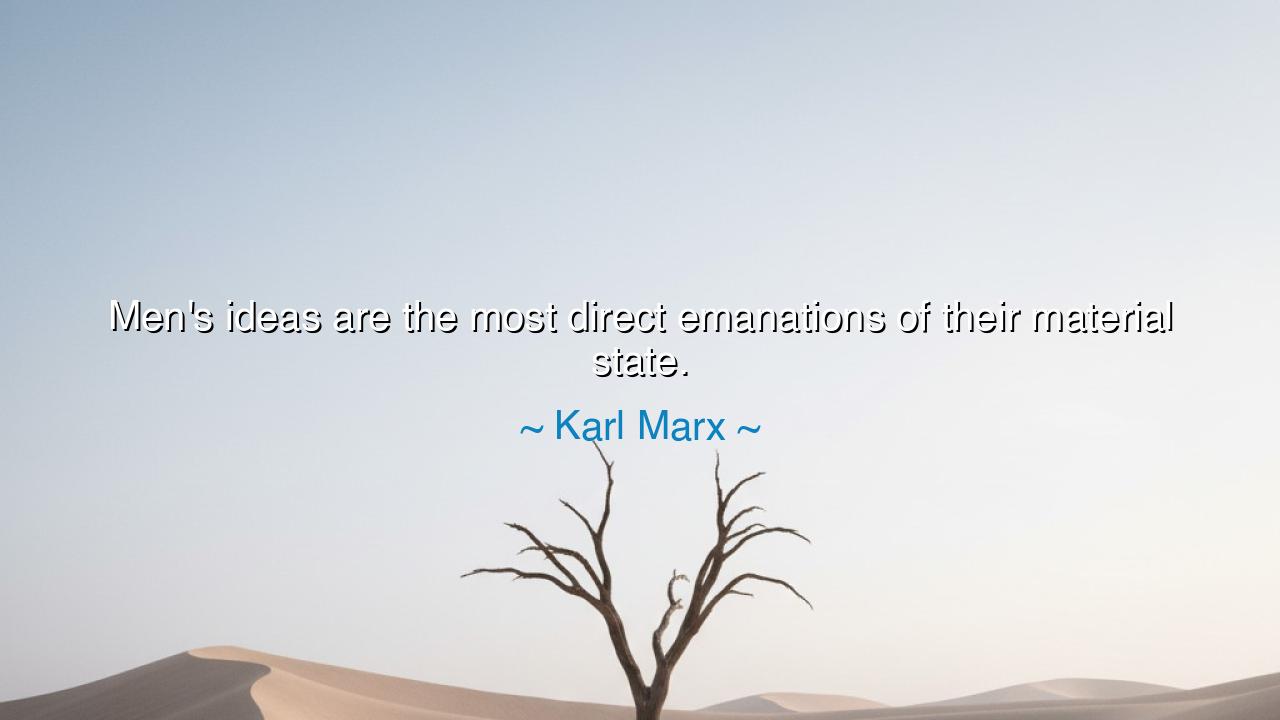
Men's ideas are the most direct emanations of their material






Hear the words of Karl Marx, the firebrand of revolution and prophet of the oppressed, who declared: “Men’s ideas are the most direct emanations of their material state.” In these words lies a hard truth: the thoughts of men do not float above the clouds in isolation, but rise like smoke from the fire of their daily lives. What people believe, what they imagine, even what they dream—these are not born of thin air, but of the conditions in which they labor, suffer, and strive.
For what is the material state? It is the ground beneath a man’s feet: the work he does, the wages he earns, the bread he eats, the roof—or lack of it—over his head. When a man is chained by poverty, his thoughts are shaped by hunger, by the struggle to endure. When he is free and prosperous, his thoughts lean toward ambition, art, and philosophy. Thus, Marx proclaims that ideas are emanations, shadows cast by the blazing light of material reality. To understand men’s beliefs, one must first look to the conditions in which they live.
History gives us countless witnesses to this truth. Consider the French Revolution: for centuries, the peasants of France had toiled while nobles feasted. Their material state was misery—famine, poverty, humiliation. From this soil of suffering rose the ideas of liberty, equality, fraternity. These were not idle musings of philosophers alone, but the desperate cry of the people whose stomachs were empty and whose backs were bent. Their ideas were the direct emanations of their condition, and those ideas shook the foundations of Europe.
Or think of the Industrial Revolution, when men, women, and children worked in smoke-filled factories, laboring long hours for meager pay. Out of that furnace of exploitation came new ideas: trade unions, socialism, the demand for rights and protections. These ideas did not arise because someone willed them in the abstract—they were born because the material state of the workers demanded them. Just as thirst gives rise to the idea of water, so suffering gives rise to the idea of justice.
This teaching is both powerful and sobering. For it reminds us that we are not detached minds floating in a void—we are beings bound to our conditions. What we believe is often less a reflection of eternal truth and more a mirror of our circumstances. The ideas of the rich, who live in abundance, will differ from the ideas of the poor, who struggle for survival. The beliefs of the conqueror, who lives in security, will differ from the beliefs of the oppressed, who dream of freedom. Thus, to change the ideas of humanity, one must first change the material conditions of humanity.
The lesson, O seeker, is this: do not judge a man’s ideas without first seeing his life. Ask yourself—what hunger, what struggle, what circumstance gave birth to his thought? And if you wish to uplift society, do not only preach new ideas, but also labor to transform the material world from which those ideas spring. Feed the hungry, and their ideas will grow into gratitude and peace. Educate the poor, and their ideas will flourish into innovation and wisdom. Deny these, and their ideas will cry out for rebellion.
So let Marx’s words echo as both warning and guidance: ideas are born of conditions, and conditions create the mind of man. If we would see nobler ideas flourish in the world—ideas of justice, peace, and unity—we must build a nobler material state, one where all may live with dignity. For when life is lifted, thought is lifted. And when thought is lifted, humanity itself ascends.






AAdministratorAdministrator
Welcome, honored guests. Please leave a comment, we will respond soon